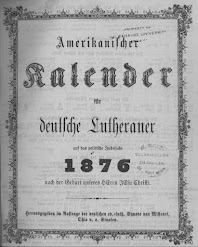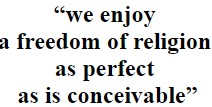- As Lindemann points out, "The Lutheran Church… has always been the most persecuted." The Puritan's struggle against the Church of England, the Mennonite's struggles, etc. do not compare to the persecutions against the true Lutherans. And C. F. W. Walther considered Lindemann among his most qualified associates and highly valued his writings.
- These German American (Missourian) Lutherans knew European history… inside out, especially on religious matters.
- The many Wikipedia articles on the same people that Lindemann covers are woefully lacking on matters of religion. With Lindemann, we see History – inside out. We get true History that can only come from those well versed in Scripture and the Lutheran Confessions. Wikipedia writers are either woefully lacking in spiritual knowledge, or are outright antagonistic to Christianity. Examples of this will be pointed out.
“ The real object of the First Amendment was, not to countenance, much less to advance Mahometanism [Mohammedanism], or Judaism, or infidelity [unbelief], by prostrating Christianity; but to exclude all rivalry among Christian sects, and to prevent any national ecclesiastical establishment, which should give to an hierarchy the exclusive patronage of the national government… ”
[by J. C. W. Lindemann]
—————
The year 1876 is a year of jubilation! July 4 marks one hundred years since the original thirteen states of the Union declared their "freedom and independence." This was a most significant event for us Lutherans as well, and we truly have cause to commemorate that day and to rejoice in this year.
The necessary consequence of the Declaration of Independence was (1787) the drafting and finally the adoption (1788) of the "Constitution of the United States of North America.” One may think what one likes about it and about its authors, — one may differ in the most diverse opinions as far as politics is concerned — one thing every Lutheran will not only have to acknowledge, but also praise and boast aloud with thanksgiving to God, namely, that this Constitution assures religious freedom to all citizens.
It does not contain any provision about the free practice of religion; but it also does not contain any word that could be interpreted as if a national church should be recognized, as if one religious community should be preferred to another, as if any religious practice would be harmful to the state. Indeed, in the first "amendment" which it received on December 15, 1791, it is expressly said:
"Congress shall make no law respecting an establishment of religion, or prohibiting the free exercise thereof. ” 1)
[ 1) The famous jurist Joseph Story, long an associate justice of the Supreme Court of the United States († 1845), says of this Amendment:
"The real object of the First Amendment was, not to countenance, much less to advance Mahometanism, or Judaism, or infidelity, by prostrating Christianity; but to exclude all rivalry among Christian sects, and to prevent any national ecclesiastical establishment, which should give to an hierarchy the exclusive patronage of the national government. It thus cut off the means of religious persecution, (the vice and pest of former ages,) and of the subversion of the rights of conscience in matters of religion, which had been trampled upon almost from the days of the Apostles to the present age." (Baird 238.)]
In these words all citizens of the Union are guaranteed the free exercise of religion; indeed, the most important principle is expressed, that the State and the Church are two quite distinct spheres, which may touch, coexist alongside and in one another in many ways; but which, by their nature, are very unequal, and must not be governed in the same way.
It would have been difficult for the men who drafted this subsidiary provision of the Constitution and gave it recognition to have realized its full significance, its entire scope; but the longer it has lasted, the more it has become the guiding principle in all negotiations between the State and the Church; for the benefit of both, a complete separation of their territories has developed more and more in the individual States; the most praiseworthy separation between State and Church now exists throughout, and we therefore enjoy a freedom of religion as perfect as is conceivable in this wretched world.
It is true that we must allow the same freedom enjoyed by "the true visible church" to the false church fellowships, the papists, the Reformed, all sects and enthusiasts, yes, even to the Mormons, Jews, freethinkers, gymnasts, and scoffers; but we should not complain about this, but should rejoice that here everyone can mean, believe, think, speak, and write what he thinks right, provided it does not offend public morals and the laws of the state. If all citizens did not have this freedom, we Lutherans would not have it either; and even if it is abused by many people in the most horrible way, it is nevertheless such an unspeakably great temporal blessing for all Christians (no matter to which confession they may belong) that they should thank God for it every day on their knees with a loud voice.
Especially — yes, especially — should we Lutherans do this, young and old, men and women, preachers, teachers and parishioners. The Lutheran Church, because it has earnestly and sincerely confessed the whole and full divine truth, has always been the most persecuted — and especially by the authorities, by princes and their ministers, by mayors and police officers. — A peace and tranquility, such as she found in our United States, she never before enjoyed to such an extent, to such a degree! This we should recognize, and be thankful to God for it!
In this country we are not only allowed to carry our most holy faith in our hearts (even the fiercest enemies must allow Christians to do this in all countries and at all times); no, we are also allowed to confess it in word and deed without any hindrance, and are protected in this by the secular authorities! We may arrange our worship in the house and in the church entirely as we please; we may form congregations, establish schools, found teaching institutions, appoint and dismiss ministers [Kirchendiener], practice church discipline, form synods — entirely as we please — no one hinders us — indeed, the authorities protect us. This is an unspeakably great blessing that our God has bestowed upon us!
But this is not even recognized and praised as a good deed by all Lutherans, much less by the Reformed and other sectarians, and least of all by the papists. It is often thought that this must be so, cannot be otherwise, and has always been so. Those who belong to our church have never experienced other times, perhaps never even heard of them; especially the generation born here has no idea or only a faint idea of how our church used to be.
In order for us to be able to give thanks and rejoice all the more joyfully, we will show below by means of a few examples how Protestants in general, and our church in particular, fared in earlier times under Catholic, Reformed, Union, and Lutheran rulers. All that is told here is in no way poetic, but authenticated history.






No comments:
Post a Comment
Comments only accepted when directly related to the post.